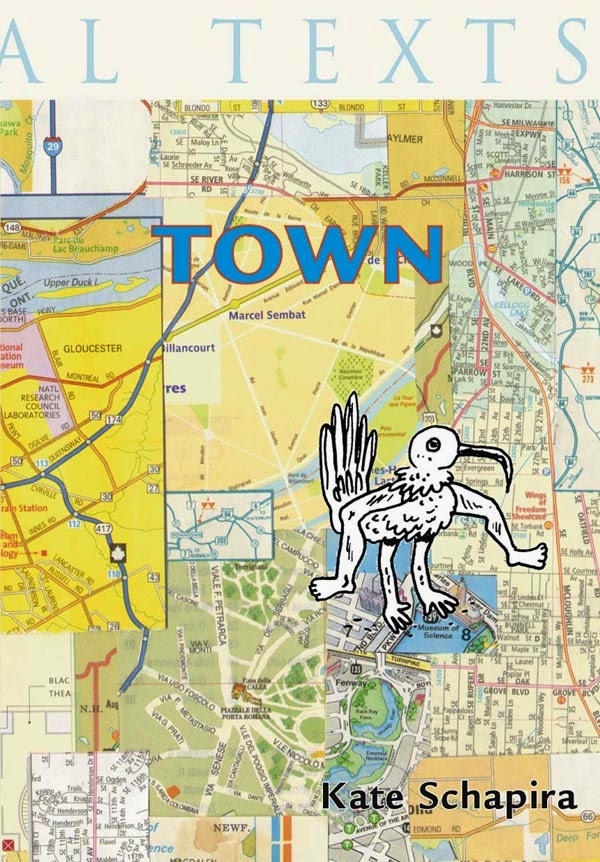FROM THE DREAMWALL: I
dreamed I smashed all the dishes, all the jars. I stood at the factory fire and
threw handfuls of corn into it, from the blackness outside it. By the time it’s
a story there will be no one to tell it. Mild eyes will make no distinction. Trees
and the remnants of houses will grow up through the streets. It’s too late not
to think about it. Once the trail roared through with its long golden mane in
the dew-soaked morning. War never came here, but change came to thicken the
water, to the spheres of flesh inside, tiny possibilities. Who dreams they give
birth to the town’s tree-heavy future? Write your dream underneath mine.
FROM THE DREAMWALL:
Sometimes I don’t think laws are so bad.
While
in the United States recently, I was able to pick up a copy of Kate Schapira’s TOWN (Queens NY: Factory School, 2010).
It’s only the second title of hers I’ve read so far (and I think the first I’ve
seen from Factory School), after The Soft Place (Horse Less Press, 2012) [see my review of such here], not including her two chapbooks produced through above/ground press. As she writes at the back of
the collection, the original materials for TOWN
were solicited, compiled and re-worked, and she includes her original
solicitation, which includes: “What I’d
like you to do is tell me one thing about this town’s past or present. You don’t
have to think about it too hard. Just type it in and send it to me. May I suggest
that you do it sooner rather than later, for busyness and memory reasons.”
Her “About Town” post-script continues:
As information about the town came in from friends,
relations and acquaintances (some of whom are working writers, others not),
some of it started to contradict itself (some pieces contradicted others), and
since I’d decided that everything people told me about the town was true, I had
to revisit my ideas about consensus: how do contradictions mutually and
simultaneously exist and what gravity do they exert on one another, without one
erasing or swallowing the other?
Composed
as a suite of fragments, prose-poems and lyric descriptions, Schapira explores
the variety of ways a town can be described, allowing the directions provided
to her through solicitation to provide an expansive town portrait, one that
becomes richer and deeper through those contradictions she mentions (as every
town, just as every person, contains at least one contradiction). From the
other trade work I’ve seen of hers—The Soft Place—Schapira appears to be interested in the extended suite, whether the
sequence of such for that later collection, or the book-length quilt of poems that accumulates into her TOWN. It makes
me curious as to where else her work is capable of heading.
Another
element of the book I can’t help but enjoy: the cover artwork by James McShane
includes a collage of maps, and a fragment on the left of the front cover not
only includes a section of a map of Ottawa, but a swath that runs along the
417/174 Highways, from Heron Road all the way north to the Ottawa River, which
means I can see where my lovely wife works (the corner of Innes/St. Laurent),
not an eight minute drive from here.
CUSTOM / LAW
FOOD
CHANGES
A family moved into a
house on a quiet street. Once they were unpacked they evoked all their neighbor’s
doors to invite them over for a watermelon margarita block party. The night of
the house only two old women came. As the second entered and was greeted by the
couple she shook hands with the other. Both women were widowed. Their houses
sat next to each other and each had lived in her own since just after a young
marriage. On this night they were introduced.
Hospitality holds its
breath as the mixture delivers. Both have grown old and human. To say, “We’re
both old,” that age happens not to the other but both, to be part of both in
town, to remember the houses they moved from dwindling in memory, becoming
matchstick, streets spreading and tiring easily, evening melting in cautious
red sips. They were about the changes of which other neighbors were a part,
sitting as they’d been taught, two women spreading and diffusing to reenter
matter, like soaked gauze, quietly into the fiber of town as streetlights
marked out the web of veins filled with isotopes moving weakly.
The couple whose house
it was told everyone how sweet it was from the outside, quick coming to tongue,
loosening flavor. The sunset looked like a lake of watermelon margaritas.




No comments:
Post a Comment